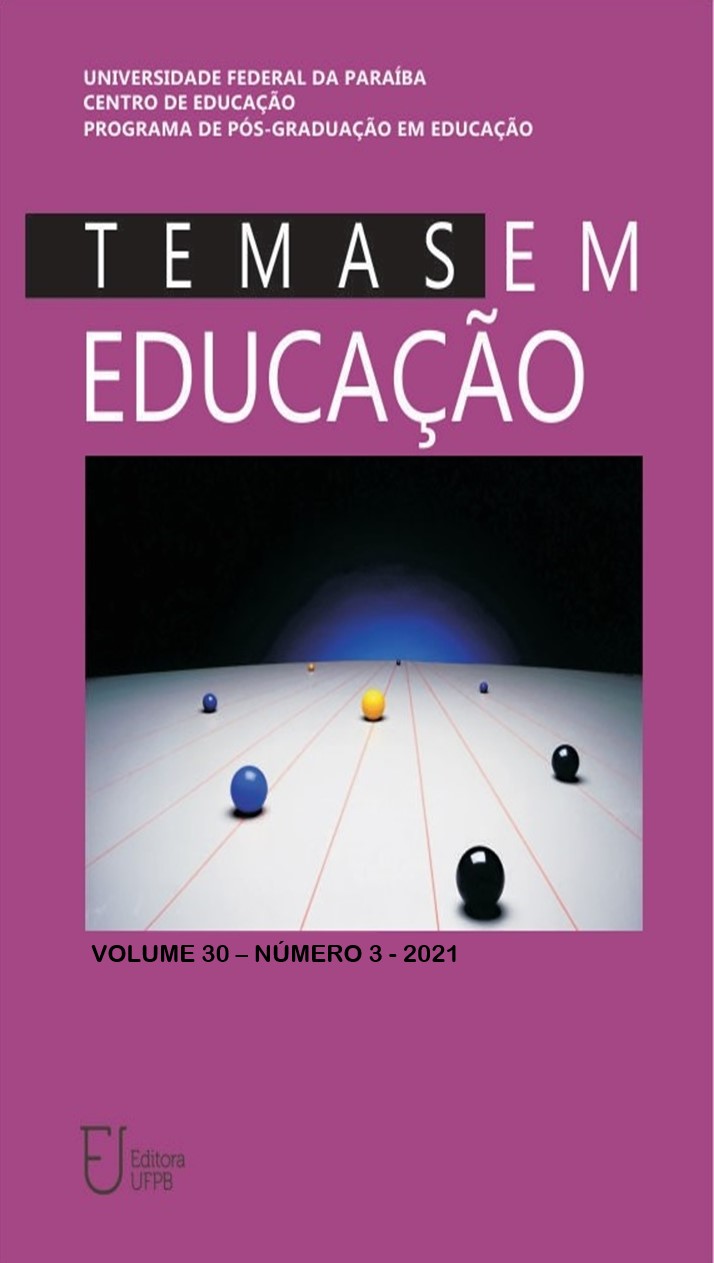CÂNONES E ESPECTROS: FUNDAMENTALISMOS OU INDETERMINAÇÕES NA FORMAÇÃO DOCENTE
DOI:
https://doi.org/10.22478/ufpb.2359-7003.2021v30n3.60932Keywords:
Autonomy. Canon. Specters. Pedagogical knowledge.Abstract
This article discusses issues related to how future teachers deal with the need to construct pedagogical knowledge, usually characterized by some anxiety for finding assumptions and fundamentals translatable into pragmatic developments. The main issue is an opposition between taking theoretical references centered on canons in the field of Education or updating spectralities that can mean constituent contagions. The search for fundamentals and the creation of upgradeable plurivocities are different ways of searching for knowledge that can influence the qualification of teachers. It seems that the consequences of this process are a repeated practice of referentiality or the motivation to reflective and more autonomous reading and writing postures. Theoretical dialogues are established with Merleau-Ponty, Derrida and Rancière, from which the ideas of research such as autonomous work, justice with specters that can return and the update of the defense of autonomy and equality of intellects proposed by Jacotot are highlighted.
Downloads
References
BERTOLDO, L. A Psicologia da Composição: Uma perspectiva do vazio: Um lançar de olhos sob João Cabral de Melo Neto, 2014. Disponível em http://gefilassessoriacultural.blogspot.com/p/literatura.html, Acessado em 17 de janeiro de 2021.
BOURDIEU, P. Esboço de auto-análise. Trad. Sérgio Miceli. São Paulo: Cia das Letras, 2005.
CARVALHO, A.D. Hermenêutica da educação: um desafio aos cânones epistemológicos das Ciências da Educação. Revista Portuguesa de Pedagogia, ano 40, v.1, p.223-231, 2006.
CASTRO, M. C. O Beethoven de DeNora: o contexto está no texto. Per Musi, Belo Horizonte, n.26, p.77-85, 2012.
DERRIDA, J. Espectros de Marx: o estado da dívida, o trabalho do luto e a nova Internacional. Trad. Anamaria Skinner. Rio de Janeiro: Relume-Dumará, 1994.
DERRIDA, J. Mal de arquivo: uma impressão freudiana. Trad. Claudia M. Rego, Rio de Janeiro: Relume-Dumará, 2001.
DIAS, F. L. Espectros de Derrida na ficção brasileira contemporânea: 1964 e seus fantasmas consistentes nas obras A resistência, de Julián Fuks, e Lavoura arcaica, de Raduan Nassar. Cadernos literários, n.2, v.1, p. 41-51, 2017.
DUARTE, J. F. Cânone. E-Dicionário de Termos Literários, p.1-9, dez. 2009.
FOUCAULT, M. Vigiar e punir. Petrópolis: Vozes, 1989.
GOEHR, L. The imaginary museum of musical works. Oxford: Claredon Press, 1992.
KANT, I. Resposta à pergunta: que é esclarecimento? In: ___________. Fundamentação da metafísica dos costumes e outros escritos. São Paulo: Martin Claret, 2002.
LENTINA, A. Editorial. Dossiê Queerizar os cânones luso-afro-brasileiro. Via Atlântica, n.33 p.11-17, jun.2018.
BERTOLDO, L. A Psicologia da Composição: Uma perspectiva do vazio: Um lançar de olhos sob João Cabral de Melo Neto, 2014. Disponível em http://gefilassessoriacultural.blogspot.com/p/literatura.html, Acessado em 17 de janeiro de 2021.
BOURDIEU, P. Esboço de auto-análise. Trad. Sérgio Miceli. São Paulo: Cia das Letras, 2005.
CARVALHO, A.D. Hermenêutica da educação: um desafio aos cânones epistemológicos das Ciências da Educação. Revista Portuguesa de Pedagogia, ano 40, v.1, p.223-231, 2006.
CASTRO, M. C. O Beethoven de DeNora: o contexto está no texto. Per Musi, Belo Horizonte, n.26, p.77-85, 2012.
DERRIDA, J. Espectros de Marx: o estado da dívida, o trabalho do luto e a nova Internacional. Trad. Anamaria Skinner. Rio de Janeiro: Relume-Dumará, 1994.
DERRIDA, J. Mal de arquivo: uma impressão freudiana. Trad. Claudia M. Rego, Rio de Janeiro: Relume-Dumará, 2001.
DIAS, F. L. Espectros de Derrida na ficção brasileira contemporânea: 1964 e seus fantasmas consistentes nas obras A resistência, de Julián Fuks, e Lavoura arcaica, de Raduan Nassar. Cadernos literários, n.2, v.1, p. 41-51, 2017.
DUARTE, J. F. Cânone. E-Dicionário de Termos Literários, p.1-9, dez. 2009.
FOUCAULT, M. Vigiar e punir. Petrópolis: Vozes, 1989.
GOEHR, L. The imaginary museum of musical works. Oxford: Claredon Press, 1992.
KANT, I. Resposta à pergunta: que é esclarecimento? In: ___________. Fundamentação da metafísica dos costumes e outros escritos. São Paulo: Martin Claret, 2002.
LENTINA, A. Editorial. Dossiê Queerizar os cânones luso-afro-brasileiro. Via Atlântica, n.33 p.11-17, jun.2018.
MERLEAU-PONTY, M. Conversas. Trad. Fábio Landa; Eva Landa. São Paulo: Martins Fontes, 2004, 79p.
MERLEAU-PONTY, M. Elogio da Filosofia. Trad. A. Braz Teixeira. Lisboa: Guimarães Editores, 1998.
MERLEAU-PONTY, M. A dúvida de Cézanne. In: Textos escolhidos. Col Os Pensadores. Trad. Marilena Chauí. São Paulo: Abril Cultural, 1984. pp 113-126.
MILAN, B. Derrida caça os fantasmas de Marx. Entrevista: Especial para a Folha, de Paris. São Paulo: Folha de São Paulo, 26 de junho de 1994.
MELO NETO, J. C. Psicologia da composição. In: Obra completa. Rio de Janeiro: Nova Aguilar, 1994.
PINTO, N. M. A estranha instituição da literatura no multiverso dos espectros. Alea, Rio de Janeiro, v.17, n.1, pp.114-126, jan-jun 2015.
RANCIÈRE, J. O mestre ignorante: cinco lições sobre a emancipação intelectual. São Paulo: Autêntica, 2015.
Downloads
Published
How to Cite
Issue
Section
License
Copyright (c) 2021 Revista Temas em Educação

This work is licensed under a Creative Commons Attribution 4.0 International License.
Authors who publish in this journal agree to the following terms:
. Authors retain the copyright and grant the journal the right to first publication, with the work simultaneously licensed under the Licença Creative Commons Attribution that allows the sharing of the work with acknowledgment of authorship and initial publication in this magazine. . Authors are authorized to assume additional contracts separately, for non-exclusive distribution of the version of the work published in this journal (eg, publishing in institutional repository or as a book chapter), with acknowledgment of authorship and initial publication in this journal.
. Authors are permitted and encouraged to publish and distribute their work online (eg in institutional repositories or on their personal page) at any point before or during the editorial process, as this can generate productive changes, as well as increase impact and citation of the published work (See O Efeito do Acesso Livre).



















